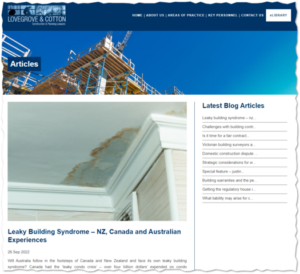Here’s a detailed but accessible write up about leaky homes that takes an international perspective. Written by Australian lawyers who specialise in construction law, it considers the risks emerging for Australia and compares it to the Canadian and New Zealand experience.
Lawyer Kim Lovegrove says increasing numbers of leaky apartments are coming to light in Australia. He notes that in other jurisdictions, many of the effected homeowners are elderly people and that “consumers have had to fund expensive lawsuits against some of the less altruistic elements of the construction industry, and the stress and financial burden of running these cases has been terrible for many litigants.”
One of the most significant points he makes is the growing issue of unsatisfactory remediation. In Canada, “Strata managers, in disclosing the status of condo wear and tear and leaky legacy for the purposes of depreciation calculations, opined that some of the remediation works that had been carried out in previous years had failed to repair the original defects and deficiencies. This law firm has encountered the same dereliction in Australia, instances where remediation contractors have been engaged to repair leaky scenarios but in months to come, the ‘repairs’ have actually exacerbated the problem.”
The author goes on to note the same issues occurred in New Zealand: “ …there were second generation and sometimes even third generation leaky building repairs. The leakies [sic] have cost billions of dollars with costs only expected to escalate as related health problems emerge.”
Kim Lovegrove is well positioned to comment, having clearly been following developments in New Zealand for decades. He notes he was criticised in the 1990s for voicing his concerns about the deregulation of the New Zealand building industry. “Central to [my] thesis was the idea that the new regime was ‘deregulationary but devoid of safeguards.’ … Do not deregulate unless you generate safeguards that will ensure that the freedoms that are part and parcel to deregulation are not abused.” He goes on to say his pessimism turned out to be “undercooked… none of us knew at the time the magnitude of that which would unfold over the next couple of decades in New Zealand.”
I highly recommend reading Peter Dyer’s book Rottenomics book which delves deep into the New Zealand leaky homes crisis and identifies the factors responsible.
